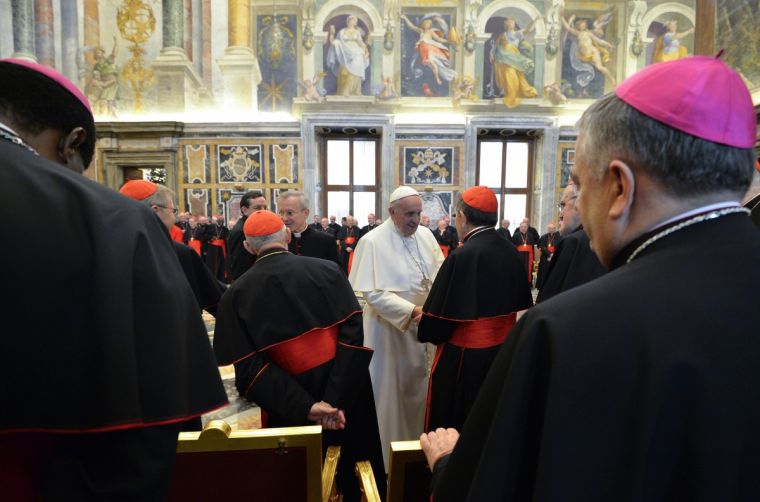Pope says the Vatican is infested with 'spiritual Alzheimer's'

The Pope has turned on his critics with a stinging denunciation of the "spiritual Alzheimer's" that infests the Vatican.
In his Christmas greeting to the Curia's cardinals, bishops and priests, traditionally a missive of seasonal cheer and good will, Pope Francis has instead stunned observers with his "catalogue of illnesses" and gossipy cliques at the heart of the Holy See.
The address, witnessed also by papal representatives from around the world, and which left many discomfited, began with cordial "holy Christmas" greetings.
He went on to describe Church as the "mystical body of Jesus Christ" and said it was "nice" to think of the Roman Curia as a small model of the Church, that is, as a "body" that tries seriously and every day to be more alive, healthier and more harmonious.
But without a living, personal relationship with Christ, a member of the Curia would quickly become a "bureaucrat, a formalist, a functionalist, a mere clerk, a branch that withers and slowly dies and is thrown away," he warned.
"The Curia is called to improve, to always improve and grow in communion, holiness and wisdom to fully realise its mission," the Pope said. "Yet it, like every body, like every human body is exposed to disease, malfunction, infirmity."
He went on to list 15 "diseases curia" that are weakening it and therefore the Church's mission.
They included the disease of being "immortal", "immune" or even "indispensable", the disease of "Martalismo", from the gospel story of Martha, meaning excessive "busyness" and the disease of "impietrimento", or being stiff necked with a heart of stone, becoming more like machines than men of God.
He also listed the disease of excessive planning and functionalism and the disease of "poor coordination" when members lose communion with each other and fail to cooperate, becoming like an out of tune orchestra.
"There is also the disease of spiritual Alzheimer's," he added, where the sufferer forgets the history of salvation and of their encounter with Christ.
Damningly, he added the disease of "rivalry and vainglory" when the appearance and the colours of vestments and insignia of honour become the primary goal of life. "It is the disease that leads us to be men and women fake and live a false mysticism and a false "quietism," the Pope said.
Then there was the "disease of schizophrenia existential", of those who live a double life, the fruit of hypocrisy the "progressive spiritual vacuum" that degrees or academic qualifications can not fill.
Others were the disease of chatter, grumbling and gossip, the disease of those who deify leaders and courting superiors, making them careerist and opportunists.
The final four were the disease of indifference towards others, the disease of the "funeral face" when everything is painted with the brush of melancholy, the disease of materialism, the disease of "closed circles" and the disease of worldly profit.
This is the disease of "people trying insatiably multiply powers and for this purpose are capable of slander, defame and discredit others, even in newspapers and magazines."
Pope Francis said: "Here I am reminded of the memory of a priest who called journalists to tell them - and invent - private and confidential information about his brothers and parishioners."
He concluded: "Brothers, these diseases and such temptations are of course a danger to every Christian and every curia, community, congregation, parish, church movement, and can affect both individually and the Community."
The response, according to observers, was "tepid" and clergy and cardinals left looking grim-faced.











